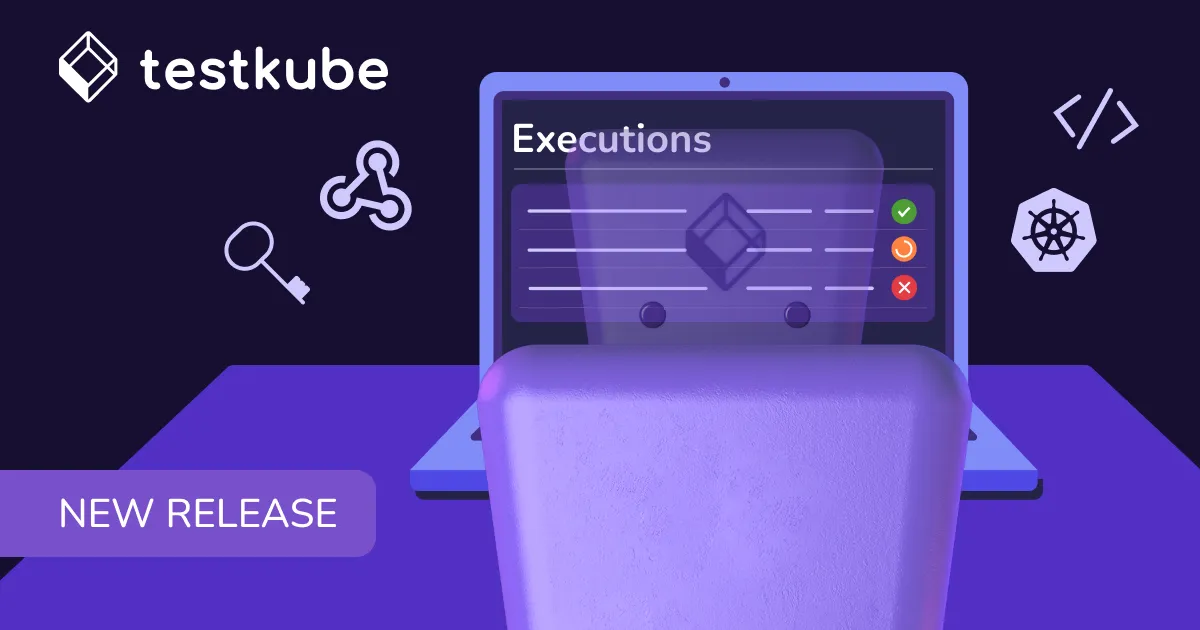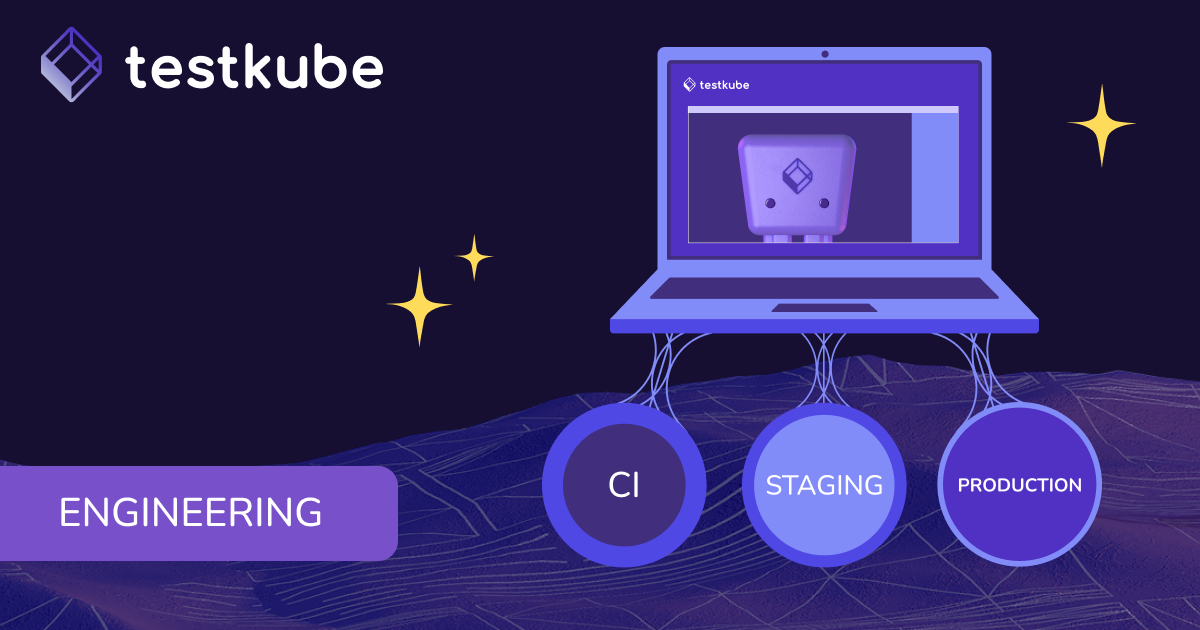

Table of Contents
Try Testkube instantly in our sandbox. No setup needed.
Try Testkube instantly in our sandbox. No setup needed.


Table of Contents
Executive Summary
Challenges of CI/CD Testing in Running Tests
Deciding When and Where to Run Tests
In a modern CI/CD pipeline, it can be challenging to determine the appropriate stage to run different types of tests such as unit, integration, end-to-end, performance, and smoke tests. Pipelines are often triggered by every code change, leading to automated test execution to verify application integrity and provide rapid feedback. However, resource-intensive tests like load or stress tests may not be practical to run on every build due to cost and time constraints. A robust testing strategy should define which tests are run at each stage to balance speed and quality.
Managing Complex Dependencies
In cloud-native environments, interdependencies between CI, CD, and the cluster state can complicate testing. Integration tests often require live infrastructure, which means CI pipelines sometimes depend on Kubernetes clusters being in a consistent and reconciled state. Without this, tests may fail due to transient issues unrelated to application defects.
Rerunning Tests
Re-triggering entire CI pipelines to rerun tests can be costly and time-consuming, especially when only specific tests need validation. Additionally, to ensure test reliability, prior test artifacts or residual data must be cleaned up between runs. This is often achieved using ephemeral environments, containers, or sandboxed namespaces to isolate test runs and prevent cross-contamination.
Consolidating Test Results
As test results can be spread across multiple systems, consolidating and analyzing them can prove challenging, hindering the ability to make informed decisions based on test outcomes. Implementing a continuous testing process helps streamline analysis and ensures rapid feedback for development teams.
Test automation and continuous testing are key to efficient CI/CD pipelines, enabling rapid feedback and higher software quality. However, not all tests lend themselves equally well to automation. Exploratory testing, user experience validation, and certain complex edge cases often require human judgment. Teams should prioritize automating high-impact, repetitive, and easily defined tests to maximize ROI.
Test Environment Management in CI/CD
Test environment management is a key component of a successful CI/CD pipeline, ensuring that automated tests run reliably and efficiently throughout the software development lifecycle. Managing test environments involves creating, configuring, and maintaining spaces that closely resemble production. This allows teams to conduct testing ranging from unit tests and integration tests to system testing in a controlled, predictable setting.
A well-managed test environment is essential for continuous integration and continuous delivery. By automating the deployment process and leveraging a version control system, teams can ensure that every code change is tested in a consistent environment. Automated testing, including unit and integration tests, helps catch issues early so that only high-quality software moves forward in the deployment process.
The testing pyramid is a useful framework here: initial tests focus on individual code components through unit testing, followed by integration testing to verify how components interact, and finally system testing to validate the application as a whole. Effective test environment management ensures that each layer of the pyramid is supported by the right infrastructure, test data, and automation.
Managing test data is another critical aspect. Keeping test data relevant and up to date ensures that automated tests and test scripts provide meaningful results. Static code analysis can be used alongside automated tests to catch potential issues before they reach production, further reducing the risk of code failures.
By streamlining workflows and automating the testing process, development teams can minimize manual testing and focus on higher-value activities. This not only accelerates the development cycle but also improves the overall quality assurance process. In addition to automated tests, test environment management supports exploratory testing, security tests, stress testing, load testing, and regression testing, ensuring that the software is robust and ready for real-world use.
Effective test environment management also fosters better collaboration between development and operations teams. By integrating testing into the development process and ensuring that test environments are always available and up to date, teams can work together more efficiently and respond quickly to code changes.
Key benefits of effective test environment management in CI/CD include:
- Faster code releases: Automation and streamlined workflows enable development teams to release code changes more frequently and with greater confidence.
- Higher quality software: Continuous integration and automated testing ensure that every code change is thoroughly validated, reducing the risk of bugs and errors reaching production.
- Reduced manual testing: Automated tests handle repetitive tasks, freeing up teams to focus on complex problem-solving and innovation.
- Improved collaboration: Shared, well-managed test environments help development and operations teams work together seamlessly throughout the development process.
- Increased efficiency: Automation and effective management reduce the time and effort required for testing, allowing teams to deliver software quickly and reliably.
By prioritizing test environment management in the CI/CD pipeline, development teams can ensure that their software is delivered rapidly, efficiently, and with the highest quality. This approach supports continuous improvement, reduces the risk of code failures, and helps teams keep pace with the demands of modern software delivery.
The Solution: Cloud Native Test Automation
To address these challenges, cloud-native testing leverages the scalability, flexibility, and automation provided by Kubernetes to streamline the testing process in a CI/CD pipeline. Software development teams benefit from automated processes that simplify workflows and enable rapid feedback. Running tests in the Cloud Native way with tools like Testkube enables teams to solve challenges such as:
Scaling Your Test Execution
Whether you need to run massive load tests or parallelize large functional test suites, Cloud Native testing enables parallel execution across distributed infrastructure, significantly reducing the time required to run a complete test suite. This accelerates feedback loops and facilitates quicker identification and resolution of issues. Automated deployment to staging and production environments ensures that new code is validated under realistic conditions.
Easy Addition of New Tests
The process of adding new tests to the pipeline should be as quick and seamless as pushing code changes. Like the DevOps approach, Cloud Native testing enables testing teams to keep pace with evolving application requirements and maintain high-quality software. Using a shared source code repository allows multiple developers to collaborate efficiently and frequently merge changes to maintain code integrity.
Out-of-the-Box Automation
Kubernetes, Terraform, and other Cloud Native tools have vastly simplified much of the infrastructure and testing automation. Adopting Cloud Native testing provides built-in capabilities that integrate easily with CI/CD pipelines, reducing the need for extensive manual configuration. This minimizes human intervention and enables faster, more reliable code releases.
Enhanced Test Result Management
Testkube consolidates test results from multiple sources, streamlining the analysis process and making it easier to identify trends and areas for improvement. Tracking test coverage and code coverage helps identify gaps in testing, especially for existing code.
Seamless Kubernetes Integration
Testkube is specifically designed for Kubernetes applications, offering seamless integration and allowing development teams to capitalize on the full potential of their Kubernetes infrastructure. Performance tests, load tests, and end-to-end tests can be integrated seamlessly to ensure system integrity throughout the development lifecycle.
Adopting these software development practices supports continuous improvement by ensuring that both new and existing code are thoroughly tested, leading to higher-quality releases.
Conclusion: Enhancing the Software Development Lifecycle
Running tests in a CI/CD pipeline presents significant challenges, including decisions about test timing and placement, managing complex infrastructure dependencies, rerunning tests efficiently, and consolidating diverse test results. Cloud Native testing solutions effectively address these challenges, empowering development teams to harness the scalability, flexibility, and automation of Kubernetes. This approach streamlines testing, accelerates feedback, and ultimately delivers higher-quality software.


About Testkube
Testkube is a cloud-native continuous testing platform for Kubernetes. It runs tests directly in your clusters, works with any CI/CD system, and supports every testing tool your team uses. By removing CI/CD bottlenecks, Testkube helps teams ship faster with confidence.
Explore the sandbox to see Testkube in action.



.avif)




